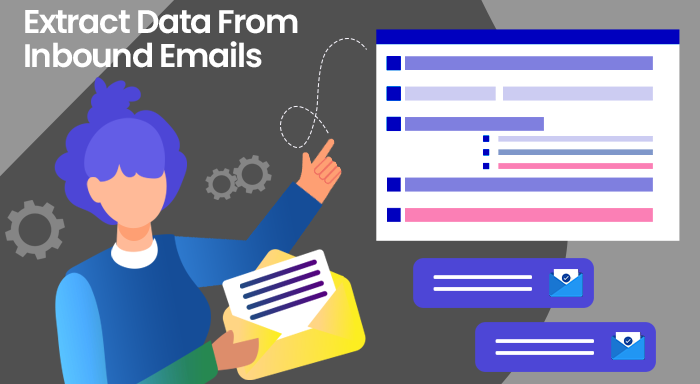Learn How To Extract Specific Data From Inbound
Emails Automatically

What A Day in the Life of a business email inbox looks like? Let’s have a look. You received an email saying a customer just created an account on your website. Someone has signed up for the newsletter. Order confirmation, invoices, purchase orders, and a lot of other crucial things. They swamped your email inbox with all this important information, and you have no way to manage it. They scattered these emails in your inbox.
Wouldn’t it be grateful if you could extract specific data from inbound emails? What’s more, you could save it on a centralized platform like a CRM or an excel sheet. What if we tell you there is a tool? It can automatically parse the data you want from emails. This automation can save a significant amount of time while centralizing the data you need. Or you can always manually extract data from the pile of emails, but I don’t think it would be productive. So let’s have a look at the first option, i.e. Automatic Data Parsing.
What is Email Parsing and How Does it Help?
Email parsing is a technique to extract specific data from incoming emails. Tools used for that purpose are called Email parsers. With this software, you can create rules to identify the part of the email which needs to be extracted, like name, email address, phone number, invoice, customer ID, and literally anything.
To understand how an email parser help, let’s have a look at one of our case studies.
Problem: A customer of ours has a LiveChat chatbot integrated into its website. And whenever a visitor registered their information like name, email, and phone number on the chatbot, it straight goes to the Gmail. The number of such visitors with inquiries was in the hundreds. A major problem was they needed to manually extract the data from the email and save it to CRM. The process was tedious because of the immense quantity.
Solution: We offered them our email to lead (email parser) solution and created mapping rules for extracting names, emails, and phone numbers from emails. So with this setup instated, all emails coming via chatbot comprising visitor’s information are converting into the leads in their CRM. The only thing they did is set up the parsing rules so the tool can identify keywords and extract specific data.
The manual data entry work, which took hours earlier, was now automated and taking place with no supervision. So that’s the power of automation for you.
What Email Parser can do for your business?
In this section, you will learn about the various ways of using the email parser. Many businesses use the methods mentioned below and have effective results as well.
- Lead Generation and Lead Management
Leads are the lifeline of every business, as a matter of fact, they’re the driving force behind a company’s sales. So it won’t be wrong to say, losing track of one lead could cost a fortune to a company. Businesses invest hundreds of thousands in their marketing campaign just to capture leads. Email parser tools will make sure no leads get lost. For example, SuiteCRM Email to Lead is an email parsing tool that extracts specific data from incoming emails and stores that crucial information in the CRM.
This is crucial for all kinds of industries, including real estate, healthcare, customer service, hospitality, travel, tourism, etc.
- E-commerce Automation
We believe email parsing tools are the most essential for an e-commerce website. The reason is crystal clear: every activity by a customer is instantly reflected in the email. For an instance, when a customer makes a purchase, we get their details in the email. Following that, we get invoices, product details, shipping details, inventory details, and much more.
Now think of manually entering and updating all the details from emails to the respective platform, i.e. CRM, inventory management system, accounting software, etc. This seems like a lot of tasks and that too for a single customer.
If you use an email parser, then all the necessary information will get extracted automatically from the emails. Some tools also offer API so that business can integrate their eCommerce website directly with it and start parsing data.
The Ending Note
The applications of email parsing tools are endless. Businesses can and are using these as per their requirements and getting results too. The parsed data can be in any form like Json, or you can directly save it to your desired platform. Most preferred destinations are CRM like Salesforce, SuiteCRM, SugarCRM, etc




